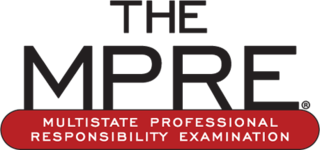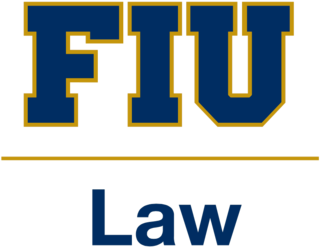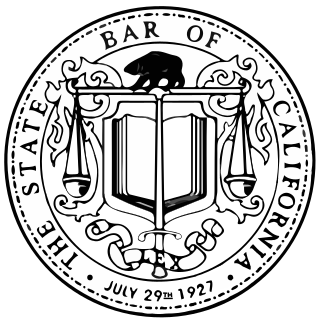Related Research Articles
An attorney at law in the United States is a practitioner in a court of law who is legally qualified to prosecute and defend actions in court on the retainer of clients. Alternative terms include counselor and lawyer. As of April 2011, there were 1,225,452 licensed attorneys in the United States. A 2012 survey conducted by LexisNexis Martindale-Hubbell determined 58 million consumers in the U.S. sought an attorney in the last year and that 76 percent of consumers used the Internet to search for an attorney.

A law school in the United States is an educational institution where students obtain a professional education in law after first obtaining an undergraduate degree.

Legal education is the education of individuals in the principles, practices, and theory of law. It may be undertaken for several reasons, including to provide the knowledge and skills necessary for admission to legal practice in a particular jurisdiction, to provide a greater breadth of knowledge to those working in other professions such as politics or business, to provide current lawyers with advanced training or greater specialisation, or to update lawyers on recent developments in the law.

Admission to the bar in the United States is the granting of permission by a particular court system to a lawyer to practice law in the jurisdiction and before those courts. Each U.S. state and similar jurisdiction has its own court system and sets its own rules for bar admission, which can lead to different admission standards among states. In most cases, a person is "admitted" or "called" to the bar of the highest court in the jurisdiction and is thereby authorized to practice law in the jurisdiction. Federal courts, although often overlapping in admission standards with states, set their own requirements for practice in each of those courts.

In law, the bar is the legal profession as an institution. The term is a metonym for the line that separates the parts of a courtroom reserved for spectators and those reserved for participants in a trial such as lawyers.
Bachelor of Laws is an undergraduate law degree in the United Kingdom and most common law jurisdictions. Bachelor of Laws is also the name of the law degree awarded by universities in Australia, People's Republic of China, Hong Kong S.A.R., Macau S.A.R., Malaysia, Bangladesh, India, Japan, Pakistan, Uganda, Kenya, Ghana, New Zealand, Nigeria, Singapore, South Africa, Botswana, Israel, Brazil, Tanzania, Zambia, and many other jurisdictions.
A cram school, informally called crammer and colloquially also referred to as test-prep or exam factory, is a specialized school that trains its students to achieve particular goals, most commonly to pass the entrance examinations of high schools or universities. The English name is derived from the slang term cramming, meaning to study hard or to study a large amount of material in a short period of time.
A bar examination is an examination administered by the bar association of a jurisdiction that a lawyer must pass in order to be admitted to the bar of that jurisdiction.

The Multistate Professional Responsibility Examination (MPRE) is a 120-minute, 60-question, multiple-choice examination designed to measure the knowledge and understanding of established standards related to a lawyer's professional conduct. It was developed by the National Conference of Bar Examiners and was first administered in 1980.

Kaplan, Inc. is an international educational services company that provides education and training services to colleges, universities, businesses and individuals around the world. Founded in 1938 by Stanley Kaplan, the company offers a variety of test preparation, professional training, career development, language training, university and student support services. The company is headquartered in Fort Lauderdale, Florida, and is a wholly owned subsidiary of Graham Holdings Company.

The Florida International University College of Law is the law school of Florida International University, located in Miami, Florida in the United States. The law school is accredited by the American Bar Association, and is the only public law school in South Florida. FIU College of Law is currently the third highest ranked law school in Florida according to U.S. News and World Report.

The State Bar of California is California's official attorney licensing agency. It is responsible for managing the admission of lawyers to the practice of law, investigating complaints of professional misconduct, prescribing appropriate discipline, accepting attorney-member fees, and financially distributing sums paid through attorney trust accounts to fund nonprofit legal entities. It is directly responsible to the Supreme Court of California, however, its Trustees are now appointed by the Supreme Court, the California Legislature, and Governor of California. All attorney admissions are issued as recommendations of the State Bar, which are then routinely ratified by the Supreme Court. Attorney discipline is handled by the State Bar Office of Chief Trial Counsel, which acts as prosecutor before the State Bar Court of California.

Barbri is a company headquartered in Dallas, Texas, whose primary product offering is a bar review course. Because of the general difficulty of state bar exams a majority of law school graduates choose to take some form of preparation course. Barbri offers law school graduates a six to seven week review course which features lectures by law professors on the seven major areas covered on the Multistate Bar Examination (MBE) – torts, contracts, real property, evidence, criminal law, civil procedure and constitutional law – along with additional lectures on the specific law of the state in which the participant plans to take the bar.

Whittier Law School was a law school in Costa Mesa, California founded in 1966. The law school was part of Whittier College, a private institution. After several years being ranked among the poorest-performing law schools in the United States based on bar passage rate and job placement, Whittier Law School announced in April 2017 that it would no longer be admitting students and would discontinue its legal program, becoming the first law school with full accreditation by the American Bar Association (ABA) to shut down in at least 30 years.Since the school's closure, transcript requests are now handled by Whittier College.

A law school is an institution specializing in legal education, usually involved as part of a process for becoming a judge, lawyer, or other legal professional within a given jurisdiction.
A correspondence law school is a school that offers legal education by distance education, either by correspondence or online by use of the internet, or a combination thereof.
The Arizona Bar Exam is the exam administered by the Admissions Unit of the Certification and Licensing Division of the Supreme Court of Arizona. A satisfactory score on the Arizona Bar Exam is one of numerous requirements for admission to be admitted as an attorney in the State of Arizona.

The Florida Bar is the integrated bar association for the state of Florida. It is the third largest such bar in the United States. Its duties include the regulation and discipline of attorneys. The Florida Bar is also responsible for the governing of Florida Registered Paralegals.

In the United States, those seeking to become lawyers must normally pass a bar examination before they can be admitted to the bar and become licensed to practice law. Bar exams are administered by states or territories, generally by agencies under the authority of state supreme courts. Almost all states use some examination components created by the National Conference of Bar Examiners (NCBE). Forty-one jurisdictions have adopted the Uniform Bar Examination (UBE), which is composed entirely of NCBE-created components.
References
- ↑ George E. Edwards, LL.M. Roadmap: An International Student's Guide to U.S. Law School Programs (2013), Chapter 27, E-8.
- ↑ Ransford C. Pyle, Carol M. Bast, Foundations of Law: Cases, Commentary and Ethics (2016), p. 7.
- ↑ Rossen, Marc D. (December 2011). "Seven Hurdles to Bar Exam Success (and how to overcome them), Vol. 60, Issue 3" (PDF). The Gavel, The Student Newspaper at Cleveland-Marshall College of Law. p. 5.
- 1 2 American Professional Testing Service, Inc. v. Harcourt Brace Jovanovich Legal and Professional Publications, Inc., 108 F.3d 1147 (9th Cir., 1997), O'Scannlain, J.
- ↑ Suzanne Darrow-Kleinhaus, Acing the Bar Exam (2016), p. 18-19.